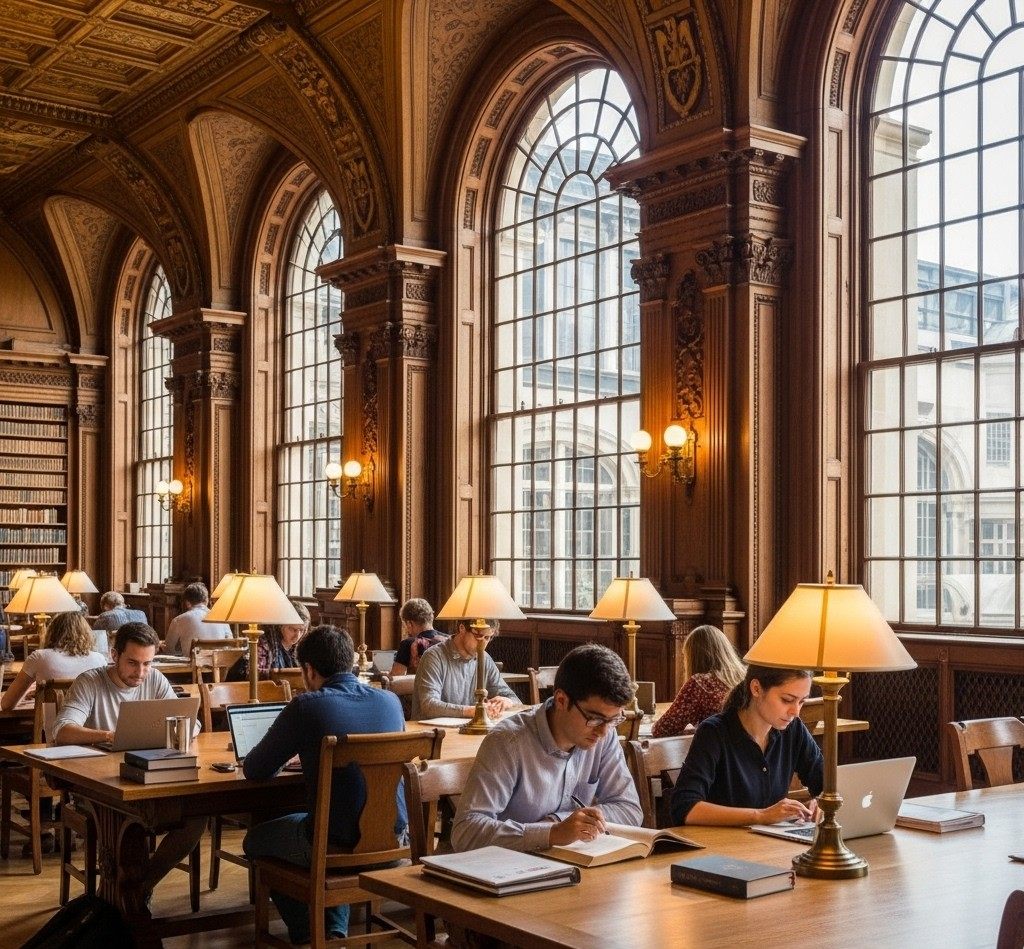The Houghton Library Fellowship at Harvard University is more than just a grant; it’s a golden ticket for scholars, writers, and artists to immerse themselves in one of the world’s most extraordinary collections of rare books and manuscripts. For many, the thought of applying to such a prestigious program can feel daunting. This guide is here to demystify the process. We will walk you through every step, from understanding the fellowship’s purpose to crafting an application that stands out, giving you the confidence and clarity to pursue this remarkable opportunity for the 2026 session.

Houghton Library Fellowship
| Key Aspect | Detail |
| Primary Goal | To support scholarly research using Houghton Library’s collections. |
| Typical Stipend | $4,000 for one month of research. |
| Application Period | Usually opens in the fall and closes in mid-January. |
| Who Can Apply? | Scholars at all levels, including doctoral students and independent researchers. |
The Houghton Library Fellowship is a highly competitive but deeply rewarding program. It offers a rare chance to dedicate a month of your life to pure research, surrounded by incredible history and a community of brilliant minds. By carefully following the steps outlined in this guide, you can present a thoughtful, professional, and persuasive application. Houghton Library.
What Exactly Is the Houghton Library Fellowship?
Nestled within Harvard Yard, Houghton Library is a sanctuary for the written word. It houses priceless materials ranging from ancient manuscripts and early printed books to modern literary archives and theatrical history collections. This isn’t just a library; it’s a vibrant hub of discovery.
The Visiting Fellowship program was created with a clear mission: to bring these collections to life. The library invites researchers from around the globe to spend a month in residence, providing them with dedicated time, financial support, and unparalleled access to materials that can transform their work. Whether you’re a Ph.D. candidate finishing a dissertation, a professor starting a new book, or an independent scholar with a passion project, this program is designed to fuel groundbreaking research.

Are You the Right Fit? Understanding Eligibility
Before you dive into the application, it’s crucial to understand who the fellowship is for. The selection committee looks for one primary thing: a research project that requires the use of Houghton Library’s specific holdings.
Academic and Professional Standing
The fellowship is open to a wide range of applicants:
- Doctoral Candidates: Students who have advanced to candidacy (often called ABD, or “All But Dissertation”) are welcome.
- Academics: Tenured and non-tenured faculty are encouraged to apply.
- Independent Scholars: You do not need a university affiliation to be a successful candidate.
- Librarians and Curators: Professionals in the field seeking to conduct research are also eligible.
The Critical Link: Your Project and the Collection
This is the most important part of your eligibility. A general interest in a topic is not enough. Your proposal must demonstrate that your research cannot be completed without access to specific items—be it a particular author’s correspondence, a unique collection of ephemera, or a set of rare first editions—that are only available at Houghton.
Your Step-by-Step Guide to Apply for the Houghton Fellowship
A successful application is a story well told. It tells the committee who you are, what you want to study, and why Houghton is the only place you can do it. Let’s break down the core components.
1. The Research Proposal: The Heart of Your Application
Your proposal (typically around 1,000 words) is where you make your case. It should be clear, concise, and compelling.
- State Your Thesis: Begin with a powerful opening that clearly articulates your research question and your project’s central argument. What are you trying to discover or prove?
- Show, Don’t Just Tell: Specifically name the collections, manuscripts, or books you intend to use. Use Harvard’s online library catalog, HOLLIS for Archival Discovery, to identify these materials beforehand. Vague references will weaken your proposal.
- Explain the “Why”: Connect the dots for the committee. How will consulting these specific items answer your research question? What unique insights do you expect to gain from them?
- Outline a Plan: Briefly describe what you hope to accomplish during your one-month residency. This shows the committee that you have a feasible and well-considered plan.
In my experience advising applicants, the single biggest mistake is failing to connect the project directly to the library’s unique materials. I’ve seen many successful applicants create a short, annotated list of 5-7 key items within their proposal to make this connection undeniable.
2. The Curriculum Vitae (CV)
Your CV should be up-to-date and highlight your academic and professional achievements relevant to the project. Don’t just list publications; if you have experience working with archives or special collections, make sure it’s visible.
3. Persuasive Letters of Recommendation
Choose recommenders who know you and your research project well. Provide them with your research proposal and a list of the Houghton materials you plan to consult. A generic letter is far less effective than one that speaks directly to your project’s potential and your capability to carry it out. Give your recommenders at least a month’s notice before the deadline.
Pro Tips for a Standout Application
Meeting the requirements is one thing; creating an application that truly shines is another. Here are a few insider tips to give you an edge.
- Reach Out in Advance: Consider contacting a curator at Houghton who oversees the collection you’re interested in. A brief, professional email introducing yourself and your project can provide valuable insights and demonstrate your seriousness.
- Focus on Originality: What new perspective will your project bring? How does it contribute to or challenge existing scholarship? The committee is excited by fresh, innovative ideas.
- Proofread Meticulously: An application with typos or grammatical errors suggests a lack of care. Read your materials aloud, use a grammar checker, and ask a trusted colleague to review them before you submit.
Life as a Fellow: Community and Discovery
Winning a Harvard research fellowship is about more than just your project. It’s about becoming part of a scholarly community. Fellows are given a workspace in the library and are invited to luncheons and events where they can connect with other researchers, curators, and staff.
This intellectual exchange is often as valuable as the archival work itself. You’ll be in Cambridge, a city buzzing with academic energy, with all of Harvard’s resources at your fingertips. It’s an experience that can shape your career for years to come.

A Scholar’s Blueprint for the Obermann International Fellowships (OIF) 2026
Your Gateway to Advanced Research: Lisbon ICS-ULisboa Advanced Studies Fellowship 2025
FAQs
Q1:When is the application deadline for the 2026 session?
While the exact date for the 2026 session is not yet announced, the deadline is typically in mid-January. Applicants should check the official Houghton Library visiting fellowships page in the fall of 2025 for the official announcement and deadline.
Q2:Can international scholars apply?
Yes, the Houghton Library Fellowship welcomes applications from scholars around the world. The fellowship can provide the necessary documentation to assist with J-1 visa applications.
Q3:Is this a fully funded rare book library fellowship?
The fellowship provides a stipend of $4,000 to help cover travel, living, and research expenses for the one-month residency. While it is a significant contribution, applicants should budget accordingly for their stay in Cambridge, Massachusetts.
Q4:Do I need to be affiliated with a university to apply?
No, an institutional affiliation is not required. Independent scholars, writers, and artists with strong research projects are encouraged to apply and have often been selected as fellows.






